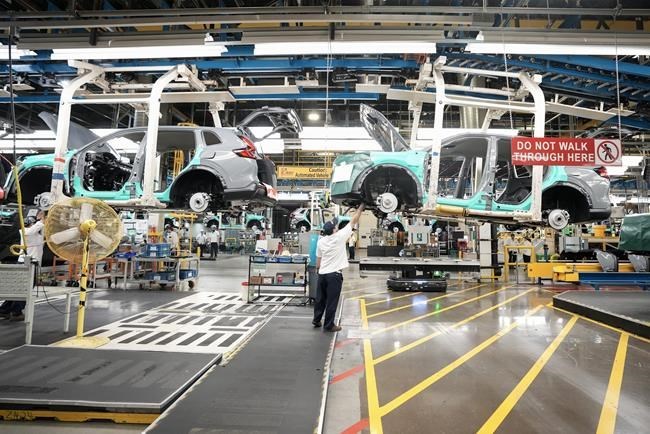
Honda employees work along the vehicle assembly line before an event announcing plans for a Honda electric vehicle battery plant in Alliston, Ont., Thursday, April 25, 2024. THE CANADIAN PRESS/Nathan Denette
Republished January 14, 2025 - 10:36 AM
Original Publication Date January 14, 2025 - 9:21 AM
TORONTO - Automakers in Canada are calling for the end of electric vehicle sales mandates because of the sudden pause of federal EV incentives and what they say is the slow build-out of charging infrastructure.
Groups including the Canadian Vehicle Manufacturers’ Association, Global Automakers of Canada and the Canadian Automobile Dealers Association collectively made the request on Tuesday after they were informed the incentive program was ending more than two months early.
"Mandating Canadians to buy (zero-emission vehicles) without providing them the supports needed to switch to electric is a made-in-Canada policy failure,” said Brian Kingston, head of the CVMA that represents Ford, GM and Stellantis.
Canada has mandated that 20 per cent of all new vehicles sold must be electric by 2026 and 100 per cent by 2035.
The industry pushback isn't new as automakers have been raising concerns since the targets were announced in 2022 that they can't be achieved unless affordability and infrastructure concerns are first addressed.
The latest call comes after Transport Canada said Friday it was halting the incentive program that offers Canadians rebates of up to $5,000 when buying or leasing electric vehicles because funding for the program has run out ahead of the scheduled March 31 pause due to high demand.
The department said more than 546,000 vehicles have been sold or leased with incentives through the program since it began in 2019.
The sales helped make EVs account for 11.7 per cent of Canada's market in 2023, up from 3.1 per cent in 2019, while new zero-emission vehicle sales hit a record high of 16.5 per cent of the market in the third quarter last year, it said.
Transport Canada says the program officially paused on Jan. 12 and only applications pre-approved before the pause will be eligible for the incentive payments. It did not say how long it expects the halt to last.
Federal Transport Minister Anita Anand said in a statement that she was delighted with the success of the program.
"We will continue to engage with industry, environmental groups, and across jurisdictions to foster collaboration in decarbonizing the country's transportation sector and becoming a global leader in zero-emission vehicles," she said.
The federal halt comes as Quebec is also pulling back on EV incentives. The province reduced its incentive per EV to $4,000 this year from $7,000 last year and says incentives will be halted entirely between Feb. 1 and March 31. The Quebec program will offer $2,000 per vehicle next year with the program scheduled to end at the end of 2026.
Electric vehicle incentives are intended to help kick-start the EV market and reduce the price tag for early adopters, with the hope that EV prices will come down as the market expands.
So far though there's been limited progress on EV prices as North American manufacturers have focused production on their priciest and most profitable vehicles, while Canada has also imposed 100 per cent tariffs on cheaper EVs from China.
"While incentives are not required forever, they do need to remain in place until at least price parity has largely been achieved," stated David Adams, head of Global Automakers of Canada that represents numerous manufacturers including Toyota, Honda and Volkswagen.
"If the government is going to mandate manufacturers to put ZEVs into the marketplace and pay severe penalties for not doing so, then government needs to ensure that it is doing its part to address key barriers to EV uptake – price and infrastructure," he said.
A report out Tuesday by RBC said a softening economy and inflation helped lead to only 28 per cent of Canadians considering an EV purchase in 2024, down from 47 per cent in 2022. It said stalled automaker EV plans will likely further push out price parity between EVs and gas-powered vehicles.
A report last year commissioned by Natural Resources Canada estimated the country needs an estimated 679,000 public charging ports by 2040, up from around 32,000 currently.
This report by The Canadian Press was first published Jan. 14, 2025.
News from © The Canadian Press, 2025